The time had come to wave goodbye to half of our quartet. It had always been Seamus’ plan to end his journey in Kigali, but, during our rest at Lake Bunyonyi, Nadia had made the tough decision to join him. After a year packed with travel, she was rightly feeling the call of home.
Ever the selfless soul, Nadia still managed to spot a silver lining to this new pattern—a solution to a problem that had been brewing over the last few days. Thanks to the cracked rim I’d sustained in Kenya, I was in need of a replacement. The replacement I’d attempted to ship out to Kigali, however, had barely made it halfway before going off the idea of foreign travel, and circling back to Ellie’s doorstep. Attempting the process again would cost two weeks at least—time we didn’t have in hand if we hoped to reach Zimbabwe within Tom’s timeframe. So, in a heroic act of immense generosity, Nadia agreed to donate her back wheel in order to pave the way for forward progress.
Following the slightly shocking results of the recent weigh-in, and to ensure that Nadia’s donated wheel didn’t suffer the same fate as my last, it was time for Madonna to tighten her belt. Both Tom and Nadia—whose own svelte set-ups were proof of their expertise in this area—had long been clamouring to comb through my kit and discard all but the necessary necessaries. This was an offer I’d previously declined, given my accord with the immortal wisdom of Hairspray. You see, the truth was I loved Madonna no matter what she weighed. It was just a shame her wheels didn’t feel the same. Crunch time had arrived—or, at least, it would soon if I didn’t shed her of some pounds.
I chose to perform the procedure myself, and ask for a second opinion from my colleagues once I’d done all I could. I began with the consumables: chains; a cassette; spare tyres—replacing parts that might not go the distance with the spares I’d been lugging around. Then came the luxuries: my second pair of bib-shorts; my only long trousers; a bar of Nablus soap—things that may well make the journey less comfortable, but that shouldn’t ultimately impede my progress. Eventually, I’d worked down to the nuts and bolts, and sat sifting through my sachet of useful fasteners, ejecting the odd screw or washer on the grounds of doubling up. I can safely say that by the end, Madonna was lean and mean. The word superfluous no longer appeared in her dictionary. Just as the words comfort, choice, and contingency had disappeared from mine. The experts surveyed my work with pride; their least-promising student had somehow become the master.
After our last Rwandan supper—which was, thanks to Kigali’s cosmopolitan credentials, an Italian—we loaded the departing pair’s boxed bikes into a pickup truck and mumbled our choked goodbyes. Our travels together had been deeply unifying. By covering such ground, in such an exposed way, through all that Africa has to throw at you, you become immensely comfortable in the close company of your group. So, when it comes time to part ways, no wonder it can feel like ripping off the plaster.
In an attempt to shake our blues, Tom and I gave ourselves a talking to and hit Kigali’s strip in search of music and dancing. A new friend we’d made at the bike shop had organised an event that night, and we’d made a tacit agreement to show face. However, as we headed over, the tempting lights of a pool bar beckoned us into its familiar embrace and we racked up, quickly reneging on our evening’s responsibilities. Thankfully, I’d learnt my lessons from the gambling of Uganda, and managed to walk away from our matches unencumbered by footwear forfeits, and, crucially, in a straight line.
I woke the next morning grateful for the sensible choices of the night before. Despite a sluggish start, before long we were in the throes of what can only be described as a Big Day. Rwanda’s riding had felt so awe inspiring that leaving the country after only a couple of days in its spell seemed nothing short of blasphemous. As a result, we’d decided to double down on Rwanda—taking a detour back inland and riding a loop of the south—and make up our time in Tanzania with, you guessed it, some hitching down the comparatively barren shores of Lake Tanganyika. Despite the promise of this motorised assistance, the introduction of our Rwandan pilgrimage meant that time was still tight. Tom’s looming deadline of August 12th seemed to light the fire beneath us, and we bolted from Kigali like caged animals set free.
I’ve often heard seasoned tourers advise that the key to endurance riding is consistent output. If that’s the case, then we were riding by the book. I am, however, neglecting to mention the theory’s crucial lemma: that consistent output is often the consequence of a manageable pace. This was where we departed from convention. The pace that day was relentless. We pedalled hard down the winding descents, dipping and weaving our way through the slower traffic, and carried our momentum into their corresponding climbs. This is the land of a thousand hills, you see, what goes down must always go up. We attacked each climb with the ferocity of a street fight, battling tooth and claw with the sustained gradients to hold each other’s wheel by any means necessary.
A familiar feeling of automation returned. Rest stops become nothing more than an opportunity to stoke the engine. Food is unleaded, water’s a lubricant. The mechanical simplicity of life is intoxicating. Before you know it, you’re back in the saddle again, legs pumping like pistons, scooping great mouthfuls of air through your intake. The landscape blurs.
We reached the town of Huye just in time to wolf down a meal and collapse in front of the football. The game attracted quite a crowd, as finals tend to. This was a crowd we hoped might share some of Kagame’s anglophilic allegiances. At the moment of the first Spanish goal, however, it became clear that there was an ideological chasm between the politicians and the punters. Sitting right at the front, on the edge of our seats, Tom and I were conspicuous to say the least. Perhaps our prominence as panicked England fans provided an irresistible opportunity for some good-natured needling, or maybe the Rwandans simply preferred to back a winning horse—whatever the reason, before long the entire crowd had rallied around La Roja.
This support continued to blossom as the game progressed, and soon reached farcical heights. Whenever the Spanish were awarded a set piece, or won possession, gleeful whoops would erupt, glasses would be charged and cheersed and, on more than one occasion, people would actually drop to their knees in joyful celebration. Our own celebrations, on the other hand, despite coming from a genuine place of national pride, appeared muted by comparison. Any attempt to ham up our own support was met and countered by reactions of such theatrical intensity that I couldn’t help but speculate whether Spanish blood ran somewhere in the line of Huyen ancestry. When the Spaniards sent the final goal soaring into the back of the net, the bar erupted. Tom and I drained the last of our beer and slunk off to bed, stepping over the various figures who’d dropped to kiss the ground in reverent praise of their team.
In the morning, I feared my colleague had been more affected by the evening’s loss than I might’ve predicted. Tom had woken bleary eyed, lamenting the night’s indulgence and cursing the morning’s hangover. I found his claim of a hangover hard to believe, given we’d only managed to put back two beers apiece, but I slipped off to fetch water and sugary drinks regardless, conscious of the looming reality of another day’s hard effort. By the time I returned, Tom had managed to dress, but his stooped, limp figure cut a sorry silhouette as he hauled himself into the saddle and began the short pedal into town for breakfast. This kilometre-long stint clearly emptied Tom’s already dwindling reserves and, when we reached the cafe, he sat with his head on his hands and stared queasily at the floor.
While I tucked into a plate of eggs, Tom picked at a bowl of fruit, slurping up the occasional slice of papaya. The hangover refused to budge. As I finished my second cup of coffee, he started to shiver. At this point, he too began to question whether it was indeed the beers that had brought him to his knees. We decided he should take the morning off and we’d reassess our plans at lunchtime. So, while Tom trudged back to the room to rest, I stripped off Madonna’s bags and hit the dirt for my daily fix of Rwandan riding.
The paths I’d chosen tracked a maze of rural villages across the endless undulations. It was election day, and each settlement was in the swing of the public holiday. Music, dancing and daytime drinking—the hallmarks of such collective festivities—cloaked the countryside in lively merriment. As I stopped in a village to check directions, a crowd of cheerful folk soon swarmed, and I suddenly remembered just how much attention gathers around the solo cyclist. The crowd was led by a man who appeared to be totally enthralled by my digital map. I remained astride Madonna, forearms resting on her bars as the crowd pressed closer to peer at my phone. The leader was soon so close that Madonna was in imminent danger of having to support the both of us.
At this point he took over all navigational responsibilities and began to scroll around the map in my hands. A game of endless amusement ensued which, as far as I could tell, consisted of the man shouting out the name of a town he’d spotted, to which the group—now some 40 strong—would agree excitedly that the place indeed existed. The response was all the more electric if one of the gathered crowd had actually been there. I let ten minutes pass like this—pleasantly surprised that I wasn’t the centre of attention after all—and let the phone soak up the limelight. When the time came to move on, I felt sure that the waves of farewell were addressed to the marvelous map, rather than its mute display stand.
By the time I rejoined the main road back to Huye, the afternoon was drawing in. Back at the hotel, I checked in on Tom, hoping to find a more spritely soul than the one I’d left there that morning. But spritely he was not. His condition had deteriorated, and I found him lying in a pool of sweat, his hangover theory in tatters, grasping for another explanation. In the hope of gaining some clarity, we took a ride to the town’s medical centre—me on Madonna and Tom on a Boda, one of the local mopeds. Unlike the London cabbie, Boda drivers are far from masters of The Knowledge, and are equally bemused when faced with a map. Given Tom was incapable of giving directions, I asked the Boda to follow me there. Unfortunately, the medical centre sat at the top of a hill, and my legs were far from fresh after the day’s ride. As I struggled up the hill, trying to drain the lactic from my legs, Tom was doing all he could not to throw up on the driver’s back—an effort which proved all the more difficult given the glacial pace with which we were progressing. Unable to shout at me to hurry up, for fear of opening the floodgates, he suffered on in silence.
When we did eventually stop, Tom leapt off the moped, fell to his knees—much like the Spanish-spirited Rwandans of the night before—and promptly emptied his stomach. Once that task was complete, we went in search of a malaria test. Luckily, we found the test, and it, in turn, didn’t find malaria. But this revelation alone did little to relieve Tom’s symptoms. We headed back to the hotel and booked in for another night.
The morning brought unwelcome news. Whilst Tom hadn’t got worse, he hadn’t got better. Deep down, we both knew what this meant. We’d set ourselves a tough schedule for the next month, and even when Tom felt able to saddle up once more, he’d hardly be riding at full capacity. I know myself just how long these things can linger. In Guinea, after suffering at the hands of a similar ailment, it was almost two weeks before I bounced back to full strength. We both knew it, but neither of us wanted to admit it. This was the end of the road for Tom. The only question was, would it be the end for me too?
After almost four months alone in West Africa, I’d been glad to close the solo chapter and welcome company back into my life. I knew that there was a possibility I’d be alone again towards the end of this journey—a possibility that had become a certainty given Nadia’s decision—and I’d made peace with that prospect. It felt almost full circle: finishing the journey as I’d spent a significant proportion of it—alone. But facing the idea so abruptly, with three months still to go, unsettled me. A vast, impersonal chunk of continent sat waiting, poised to swallow me whole.
For a day, I stood on the edge of the pool, feet frozen, unable to jump. We made lukewarm commitments to keep tabs on Tom’s health and see if he might surface, but this did little more than soothe the sting of reality. As the day drew on, I settled with grim resolution on the only solution. I had to go on. That night, we escaped the four walls of our room for another last supper. On the Boda into town I closed my eyes. It’s a strange sensation to speed through total darkness, wind whipping at your face as you hurtle into an endless abyss, entirely at the mercy of someone or something beyond yourself. All you can do is breathe. It struck me that this journey holds something of the same vulnerability. And through all the changes, all the challenges, all you can do is hurtle on and breathe.
The next morning, at first light—and after another choked goodbye—I set off. My plan for the day was to ride hard. When your body’s screaming, I wagered, it’s harder to hear the spiralling doubts. I spent the first quarter of my day piecing together a similar patchwork of villages as I had the day before. The going was slow and the company persistent. A steady sountrack serenaded me. Cries of Muzungu Muzungu! and Give me my money!—a favourite in Rwanda that makes you wonder whether the error lies in the translation or in the understanding of property law—echoed through the valleys. Each eruption would draw the attention of my presence to the next group who’d scramble down the banks to join the furore.
Occasionally, a brigade of bright-eyed children would become so excited that they’d sprint along the road, spouting learned phrases with evident glee. At the base of one climb, a pint-sized girl and her half-pint brother leapt into action and kept pace with Madonna as we climbed.
Goode-morning! she’d shout.
Good morning! I’d reply.
How-ar-yoo! she’d shout.
I’m fine, thank you, how are you? I’d reply.
Yime-fine! she’d shout, Goode-morning!
And so the cycle would repeat. This quickly became a wonderful distraction from the effort of the climb and the heat of the mid-afternoon sun, which was beating down with uncharacteristic ferocity. By the time we’d spun 20-or-so laps of this dialogue, I’d rather settled into my conversational cadence; so much so that when the pip squeaked Goode-Aftanoone! I nearly fell off my bike.
Sadly, these happy, relational interactions all but disappeared amidst the sheer volume of transactional ones, and by late afternoon, I’d had to abandon responding altogether. Being treated as nothing more than a drive-by ATM is tiring, and I began to worry that, over the coming months, I’d be seen as little else. The effect as a solo rider is compounded. Not only do you have to deal with the full force of the attention, rather than it naturally dissipating amongst your group, but this attention also makes up the lion's share of your human interaction each day. The gap left by old friends, and the quality, relational interactions of the last weeks soon felt chasmic.
As evening fell, the road, which had been a welcome companion for some quick and relatively undisturbed progress, disappeared. The terrain briefly cycled through the seven levels of unpaved hell—which included brutish boulders, washboard ridges and sand—before settling on a treacherous concoction of potholed gravel hidden below a layer of thick silt. Besides the sheer impossibility it presented in picking a line, this surface also proved particularly bad at remaining, well, on the surface. Every vehicle that passed would kick a cloud of the stuff up into the air. I can assure you that inhaling the road is far less fun than riding it. The only solution was to cover my airways with a buff, crack out my second headlight—a luxury I’d been permitted to keep by the bike-lightening pros on the grounds of safety—and press on into the night.
Now, if there’s one thing you don’t need nine hours into a day's ride, where half of the 180km you’ve ridden has been off road, is to suffer at the hands of a prank on a delayed fuse. As I breathed heavily through the thick fabric of my mask, a familiar sensation began to build. What began as a tingle soon caught and my lips erupted in flames. The chili. As the realisation of this sabotage dawned, an inkling came with it—a feeling that, perhaps, this was exactly what I needed. Alone again, yes, but a shadow of company remained; the burning memory of a journey shared.
So I’d like to take this moment to thank my three companions.
Nadia, you navigated the road like a true pro. You were perpetually steady, even in the immediate aftermath of an epic crash. Your endless curiosity pushed us all to explore these countries to the max. Your generosity was immense, from unbridled fruit stops all the way to back wheels. And most impressive of all was your honesty in understanding what you were feeling, and where you needed to be. It was a pleasure to share the road; something tells me it’s not for the last time.
Seamus, you were a rockstar. Talk about being thrown in at the deep-end. It’s not every first time bike tourer that can say they’ve cycled 2500km through East Africa. You put up with all the road had to throw at you and dealt with it with humanity, humility and a hearty helping of humour. The ride hasn’t been easy: from a lost wallet in Uganda, to lost feeling in your fingers; from Higgleys to Jiggleys to rock-related trickery. But despite all this, and even with a weekly ribbing at my own merciless hand, you’ve never once been anything but game. You’ve shown yourself to be one hell of a cyclist.
And Tom, I’m gutted we couldn’t continue the journey together. But I’m glad you chose to stay in Rwanda and tackle a journey of your own when your strength returned. In those weeks, you experienced the emotional rollercoaster of solo cycling; the vulnerability of life alone on the road; and the kindness and care of people who see someone that needs it. Credit to you for sticking it out, and making the absolute most of life’s inevitable turbulence. I can only hope you write your own stories about those days… they’d make some roaring tales.





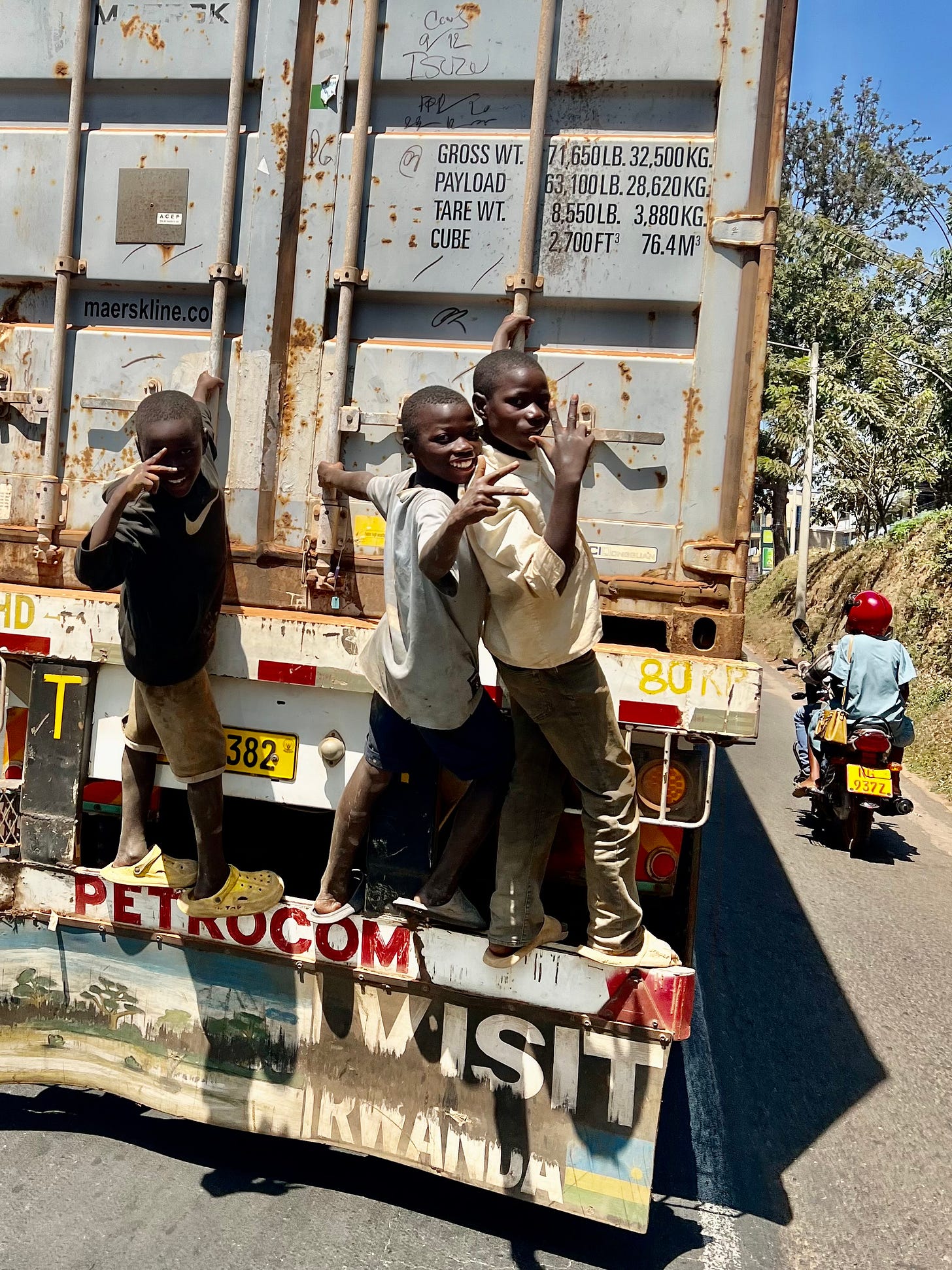
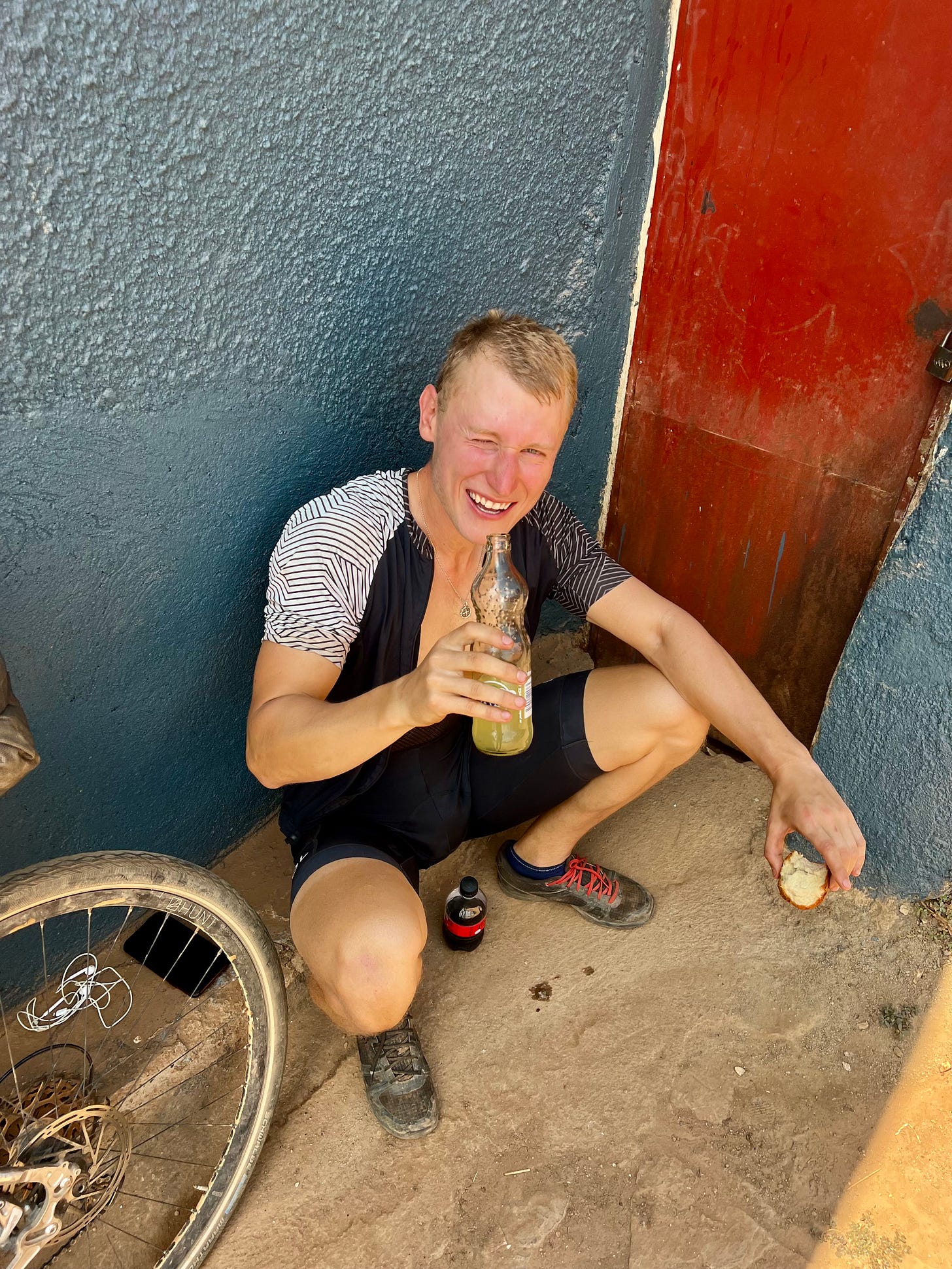

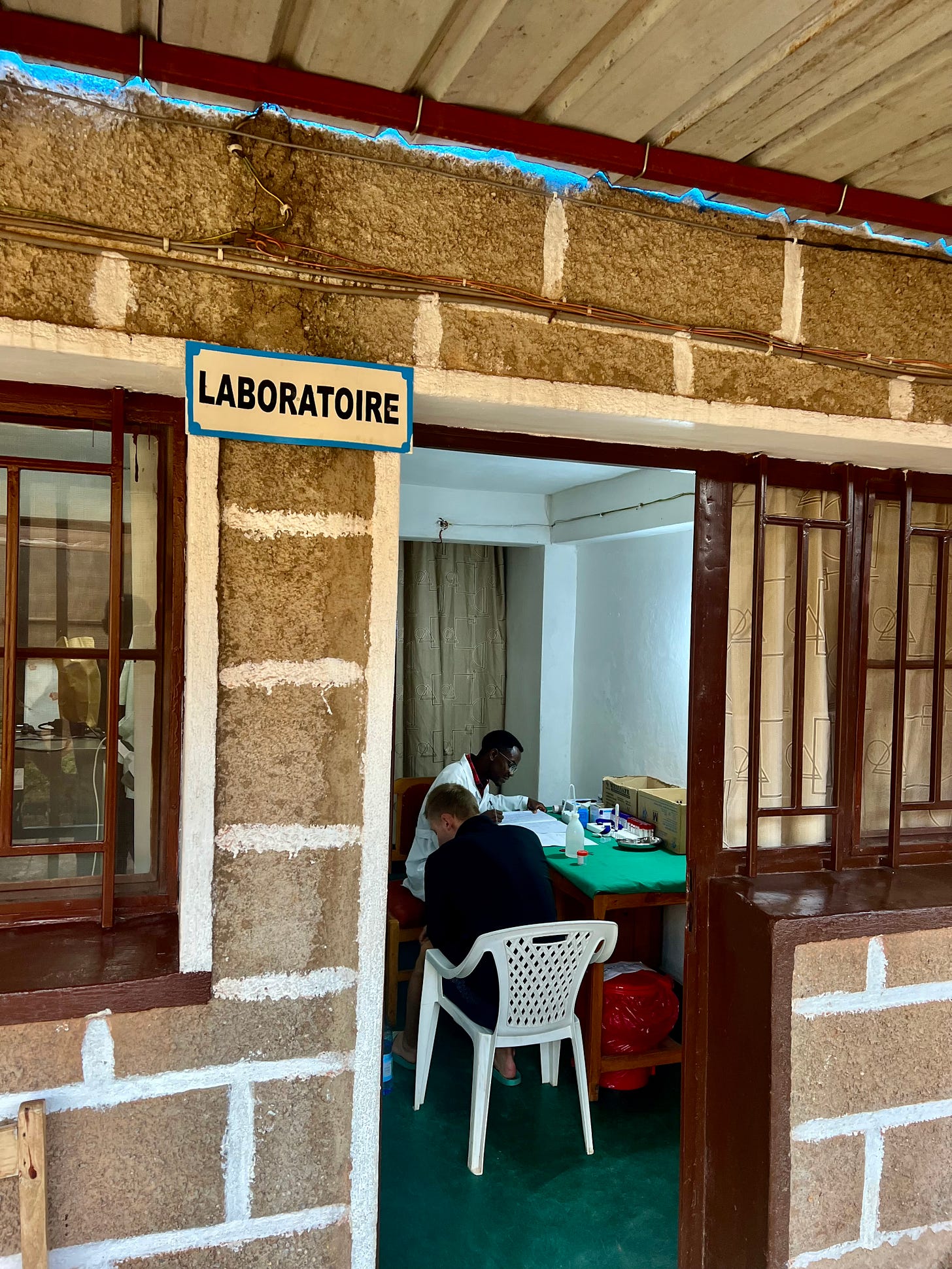

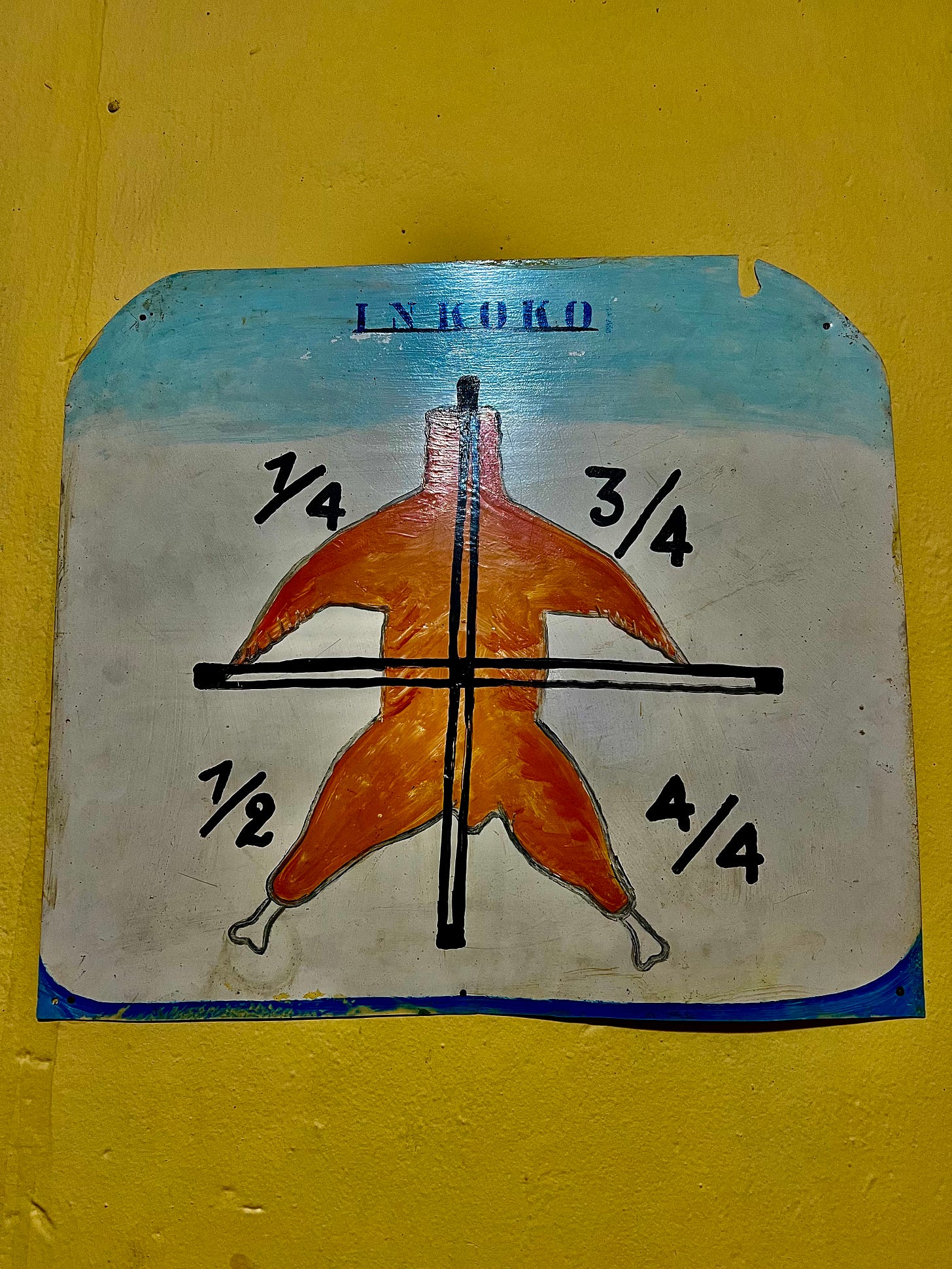
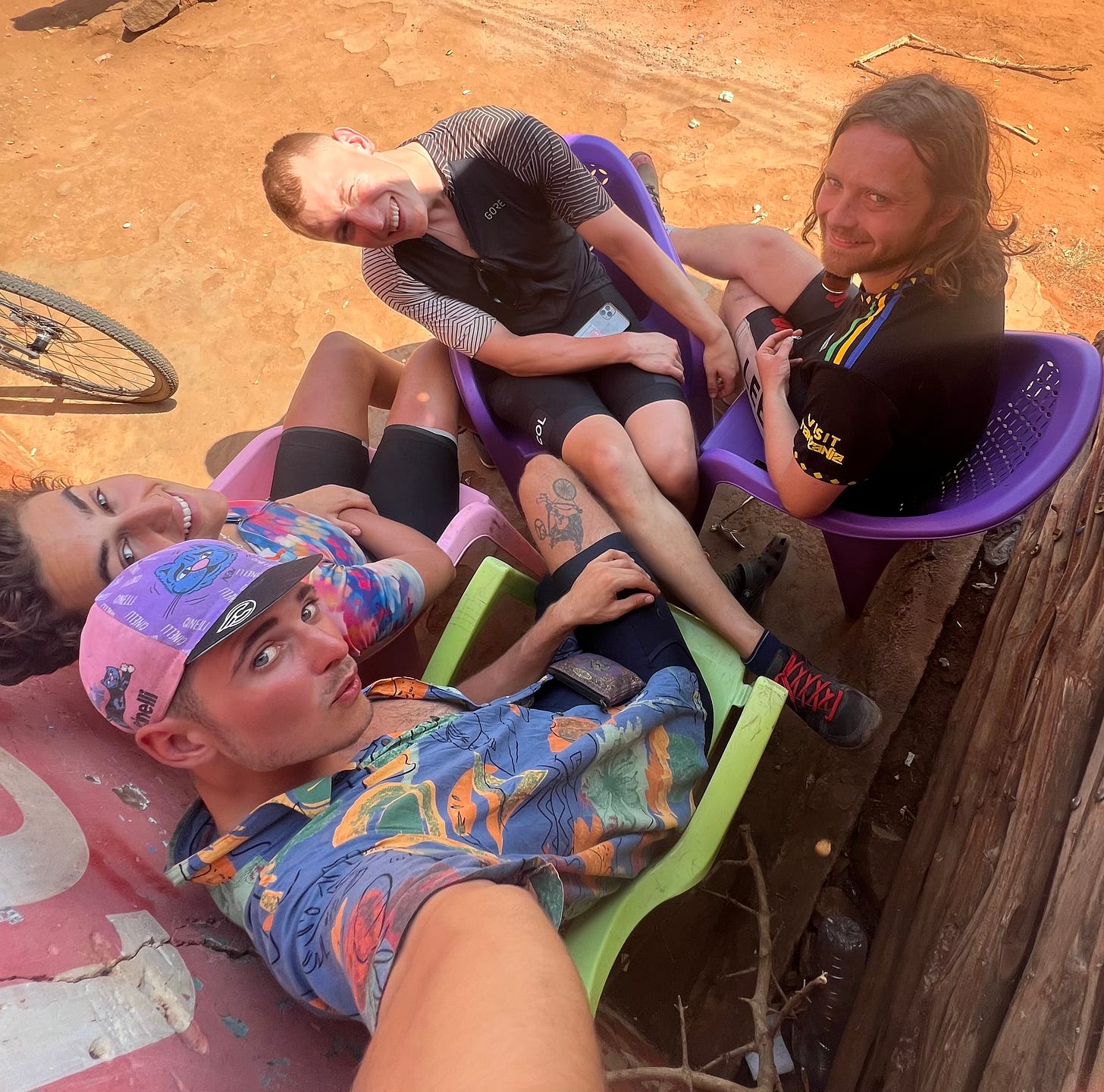
Rosie - and then there was one - solo and on you go xxxx
Hurtle on and breathe. Godspeed